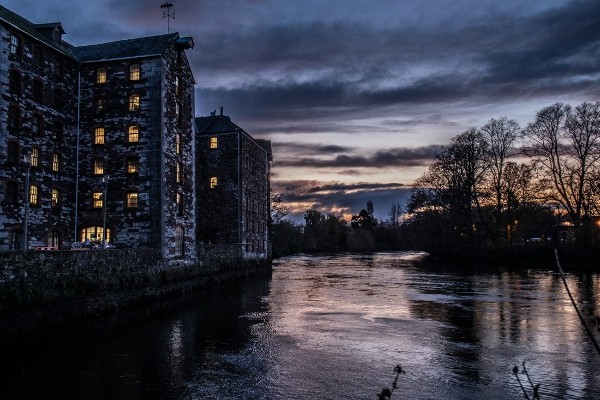
2020 a year that many of us are in a hurry to forget when we truly lived during what has been called ‘extraordinary’ times.

In Tyndall, our year started off on a high with the launch of our 2025 Deep-Tech Strategy. An ambitious roadmap and five-year strategy representing our shift in focus towards addressing the world’s major societal challenges.
We successfully launched the Tyndall Early Career Researchers Network with the goal of fostering our future research leaders. At the end of the month, we celebrated our post-graduate students as they showcased their research excellence in the 2019 Postgraduate Paper Competition.
For Engineers Week at the beginning of March, we had the pleasure of profiling Julie Donnelly, Tyndall’s first engineer.
Then, COVID hit.
As a community of researchers, students, staff, carers, parents and people - we rallied together to navigate a somewhat uncertain time.
Speaking honestly with Tyndall’s resilient women researchers, we shared how they were adapting to the “new normal” of Motherhood on the WFH Front Line.
Research funders around the globe mobilised rapidly to provide opportunities for researchers and innovative companies in an attempt to investigate how technology could be used in different ways and together help the world tackle COVID.
CREW, also known as the COVID-19 Remote Early Warning System and temperature sensing device was developed in partnership between the College of Medicine and Health at University College Cork (UCC), the Cork based software consultancy 8 West, the ASSERT centre and Tyndall. A critical ‘game changer’ meant Healthcare workers could be protected by a new remote early warning system.
Supporting the global fight against COVID-19, Tyndall launched a respiratory solutions site for emergency use. The website made freely available to the global community resources for high-volume manufacturing capacity of sealed diving masks for non-invasive ventilation of COVID-19 patients.
Behind the scenes, both staff and students played their part:
- Dr Fatima Gunning, Head of Graduate Studies shared insight into how she and her team together were leading graduate researchers through extraordinary times.
- Researcher Dr Huihui Lu as a volunteer was on call for COVID and inspired other researchers to support the efforts of those on the frontline.
- Brendan O’Driscoll, Health & Safety Officer, shared how he was leading Tyndall health and safety in a pandemic and the importance of a safety culture.
- Eilís Mulcahy, HR Generalist Eilís discussed the wellness supports Tyndall HR implemented and general wellbeing in the workplace during WFH
- Researcher Marinara Marcato investigated new ways of interacting with people and was awarded a prestigious grant to run interactive online summer camps for children.
As we now reflect on how we navigated through these turbulent times, we’ve discovered some brighter moments and reasons to celebrate.
2020 marked the bicentennial of John Tyndall, the physicist for whom we are named after and one of Ireland’s most influential scientists. In honour of his scientific legacy, we, together with our partners, launched a range of inclusive bicentennial activities that were celebrated online and around the world. The Bicentennial Celebrations #Tyndall200 included:
- I Know Why the Sky is Blue – Do You? - a livestream hosted by Carlow County Council celebrating John Tyndall’s life which featured Roland Jackson, biographer and author of The Ascent of John Tyndall; Julie Donnelly, Head of Infrastructure Access Programmes, Tyndall; and Martin Nevin, Carlow historian and authority on Tyndall.
- Tyndall Science at Home - a series of at-home experiments presented by Tyndall researchers and their families to share John Tyndall’s love for science with children and adults to enjoy at home.
- The launch of the Tyndall Scout Badge with Scouting Ireland recognising John Tyndall’s extraordinary contribution to science and education.
- Invisible Light - artists Anne Cleary and Denis Connolly from The School of Looking collaborated with scientists from Tyndall and SFI Research Centre for Photonics IPIC, and curators at Crawford Art Gallery to create an exhibition that unified art and science, marking the bicentenary anniversary of the birth of visionary Irish scientist John Tyndall. Although the exhibition sadly had to close its doors to visitors due to the country moving to level 3 restrictions with the pandemic, the exhibition was brought to life online through the public engagement initiative ‘Ray Days’.
- Royal Institution Lecture - in continued celebration of the bicentennial, the Royal Institution hosted a special lecture with Tyndall’s scientist Dr Paul Hurley. During this talk, Dr Hurley demonstrated examples of John Tyndall’s 19th Century scientific achievements and their connection to our current information and communication age, and to critical environmental concerns of the 21st Century.
We are now one month in of 2021 and many would feel we are back to square one.
Michael Rosen’s much loved children’s poem, ‘We’re going on a bear hunt’, comes to mind. When faced with what appears to be insurmountable obstacles the intrepid trekking family declare in unison ”We must go through it!” – and for us all, go through it we must, with the same determination and combined effort displayed in 2020, that allowed us to thrive despite the hurdles that adjusted our stride.

Tyndall National Institute
